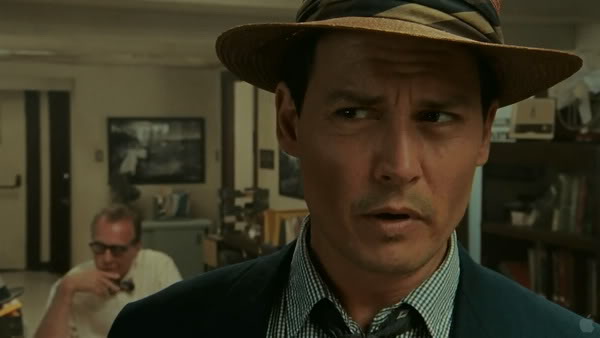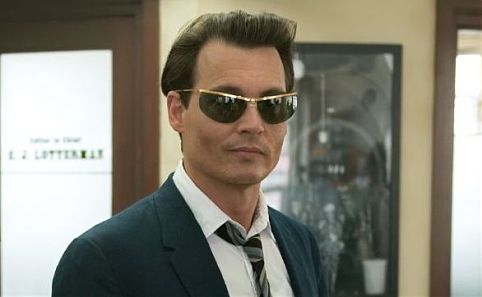|
The Rum Diary
Reviewed
by
Andreas Wong on
March 1st, 2012
Fox presents
a film directed by
Bruce
Robinson
Screenplay
by
Bruce Robinson, based on the novel 'The Rum Diary' by
Hunter S. Thompson
Starring:
Johnny
Depp, Aaron Eckhart, Michael Rispoli, Amber Heard,
Richard Jenkins and Giovanni Ribisi
Running
Time:
120 mins
Rating:
M
Released:
March 15th,
2012
|
7/10
|
|
In some
hotel room out
in San Juan, Puerto Rico, a stunned American, reeling from a hangover,
drags his
curtains aside and is blinded by a rush of sunlight. A lesion sits
across his
mouth. His right eye is freakishly bloodshot. It is set upon the
droning
seaplane that tore him away from his slumber. The room he is in appears
as if
it has been laid waste to. The furniture is erratically disordered.
Even the
minibar is tipped over, tilted at an acute angle against the floor.
Meet Mr.
Paul Kemp (Johnny Depp): an unassuming cool guy, would-be novelist and
dipsomaniac
extraordinaire. Needing a change of scene from Eisenhower-era America,
Kemp is in
town at the behest of Edward J. Lotterman (Richard Jenkins),
editor-in-chief of
“The San Juan Star”, a local newspaper, for a job interview. In spite
of his
inability to speak Spanish, he somehow gets himself a taxi ride down to
the newspaper’s
central office. It is not long before he is seated across from
Lotterman
himself. Paul is appropriately dressed for the occasion excepting for,
of
course, his ridiculous sunglasses. Lotterman throws his weight around,
calling
out Kemp’s “red eye” with knowing surety and alleging that Kemp’s
résumé is full
of bullshit. After letting Kemp stew for long enough, Lotterman informs
him
that he’d already landed the position before he even walked in. We
learn later
on though that it was simply because he was the only applicant.

Kemp
finds himself on
a steep learning curve as he learns about the paper’s operations and
gets acquainted with its buzzing hive of drones. One of
his colleagues, an eccentric Swede known only as “Moberg” (Giovanni
Ribisi), is
the crime and religion correspondent - a man who is rarely spotted out
in the
daytime, is always completely plastered and owns Nazi paraphernalia.
Paul is
made to cut his teeth on horoscopes and bowling news. He immediately
strikes up
a friendship with Bob Sala (Michael Rispoli), a street-smart veteran,
who is
waiting for the paper to go under so that he can gather his severance
and
retire over in Mexico. Not long into his stay, Kemp also gets himself
headhunted
by a wealthy, powerful and shady figure by the name of Hal Sanderson
(Aaron
Eckhart), who noticed his prose whilst reading a recent issue of the
paper. Sanderson,
representing a discreet group of American entrepreneurs, sets out to
recruit
Paul as part of a grand design to obtain the license for a luxurious
hotel, with
the secret intention of erecting it on a neglected island paradise that
formerly
served as a nuclear testing site. These elements form the bare bones of
the
narrative. From here onwards, the story fleshes out into a freewheeling
adventure that features a sultry siren, hysterical situations and
bitter truths.

Johnny
Depp returns to
cinema screens in a Bruce Robinson picture that adapts Hunter S.
Thompson’s
second novel. The novel was written in 1961 but published only in 1998.
It preceded
his celebrated Fear and Loathing in Las Vegas:
A Savage Journey to the Heart of the American Dream by a whole
decade, a
book that itself incidentally got adapted into a movie that Depp also
starred
in. Unfortunately, Depp’s reprised role as a gonzo journalist
falls flat as he turns in a vanilla performance that
errs far too much on the side of caution. Kemp is conceived as an
alcoholic writer
tempered by a sober talent. His is an enigmatic soul with many strings
to its
bow. He is a chronicler with a conscience, a Coleridge admirer who
believes that
he has not yet discovered his own authorial voice and a winsome
personality who
exudes clownishness in every fibre of his being. In stark contrast to
Raoul
Duke, Paul is a protagonist whose characterisation demands subtlety and
maturity,
and Depp disappoints due to the degree of his restraint. In only his
fourth
feature in a near quarter of a century, Bruce Robinson, the English
director of
the cult classic Withnail and I (1987),
shoots a hilarious and beautiful film that gets the audience astir but
doesn’t
go anywhere. It finds a visual correlative in a scene where Paul and
Chenault
(Amber Heard), Sanderson’s flirtatious floozy, shred a straight stretch
of road
at a rip-roaring 120 miles per hour in a red 1959 Chevrolet Corvette,
until
they come to a dramatic halt right at the edge of a perilous dead end.
The film
truly works
when its jokes are successfully executed and it has more than its fair
share of
those. They usually take shape in outrageous situations where Kemp and
his ragtag
crew run wild. In one particularly uproarious sequence, Kemp is forced
to sit
on Sala’s lap in order to steer the car, bobbing up and down with
increasing
frequency, just as a cop car belonging to one of the policemen whose
face Kemp
had scorched with spewed fire only the night before cruises alongside
them. The
comedy is always at its balls-out funniest when the inebriate Moberg is
around.
With his Squidward-like appearance, his extempore verses of drunken
poetry and
his utter abjection, Moberg is the film’s comic golden goose. The
strengths end
there. Whilst Robinson’s film draws out all that it can from the
screenplay he ran
with, there is a hollow feel to the story that one cannot escape. It
feels as
if there is no deeper meaning behind it all. The politics, the poverty
and the paper
all blur into a distant background that merely sets the scene for the
wild ride
that Paul is on. They never develop into anything more. At the
newspaper’s
eleventh hour, a rebellious plot to publish an devastating expose on
all the crooked
dealings going on behind the scenes ultimately falls through as reality
firmly takes
hold. The ending feels bathetic and futile. Depressingly so. However,
the
bottom line is that the punch of the humour, the beauty of the imagery
and the
spirit of the story ensure that this journey is still well worth taking
even if
it only takes you to the middle of nowhere.
|